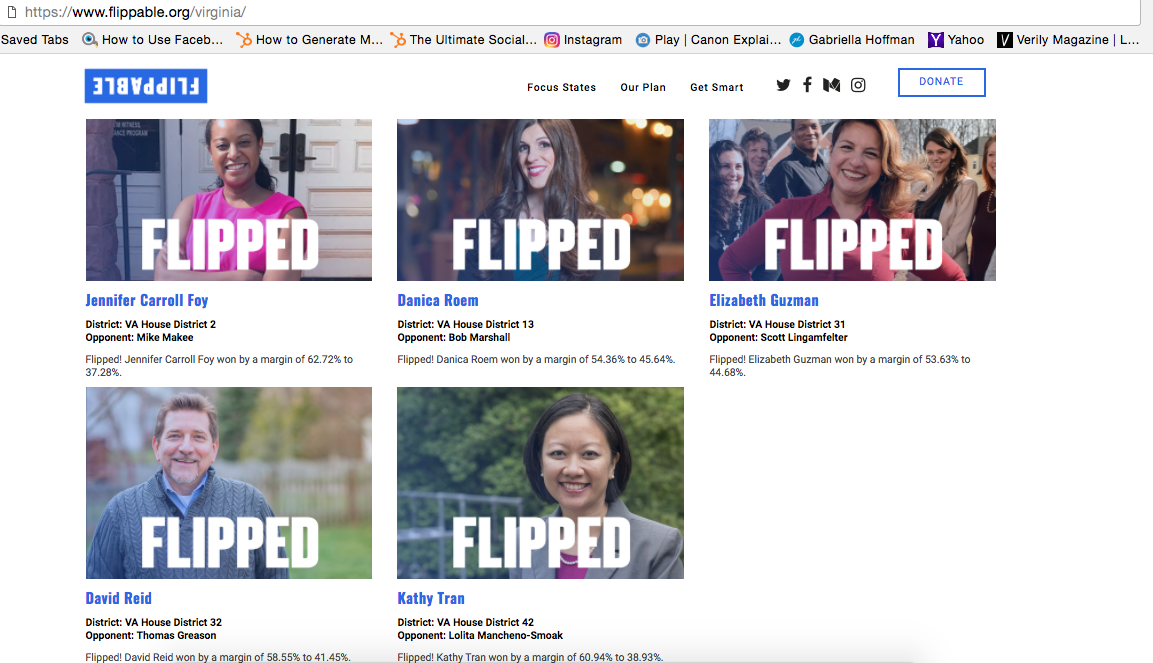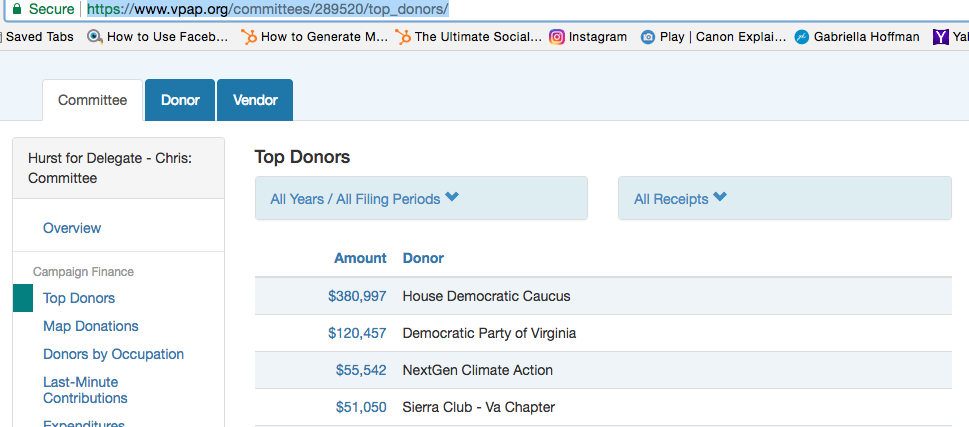Last month, the most surprising electoral upset in Virginia came after the Republican supermajority in the House of Delegates shrunk from 66 seats to 51 seats. (The House of Delegates boasts 100 seats, of which 51 now belong in Republican control.) Democrats are set to challenge two seats, which could shift HOD control to Democrats. With the incoming Northam administration, which will be an extension of the status quo in place now, Virginia Republicans are far less influential than they were last session.
What the heck happened?! Yes, Virginia has been shifting blue for a number of years—thanks to the influx of government contractors and bureaucrats moving from Northeastern states into former Republican strongholds in the suburbs.Many of the incumbent Republicans who lost got too cozy in their seats and failed to treat challengers with the seriousness they should have. How did Democrats manage to flip a sizable chunk of House of Delegate seats from under Republicans’ noses?
Your campaign is your brand and your brand cannot thrive without tools to drive home your message.
Here are three factors explaining why Democrats won 15 HOD seats this past fall:
#1: New groups like Flippable were under-the-radar, but instrumental in flipping Republican seats blue
Seizing upon Republican control of most state legislatures, Democrat candidates and their surrogates have been quietly mobilizing voters — as evident in last month’s results. That’s where groups like Flippable come in.
Groups like Flippable claimed credit for five of the 15 House of Delegate seat flips.

Source: Flippable
They admit that they’re ignored states, as their CEO Catherine Vaughn wrote, “States write the rules for national elections, so state leaders act as the guardians for our country’s democracy. Lately — because the national GOP had invested so heavily in state races starting in 2008 — those guardians were mostly Republicans. And many of those GOP state leaders were doing everything they could to keep Democrats’ votes from counting in national elections.”
While I vehemently disagree with her assessment about Republican control of state legislatures—Republicans had winning ideas pre-2016 while Democrats shifted too far left—Vaughn’s group wants to challenge this majority by 2020.
Here are Flippable’s goals:
- To build community among Democrats to “flip to good government”
- Run data operations to determine flippable seats
- Helping candidates win
Moreover, here’s Flippable’s methodology:
I. PRIORITIZING STATE CHAMBERS
What does this mean for Republicans in the majority? Your seat could be a target. These folks are serious.
II. FORECASTING OUTCOMES TO SELECT FLIPPABLE RACES
Here’s how they plan to forecast flippable seats:
We’re building a regression model that uses previous electoral history to understand the historical relationship between state legislative, statewide (e.g., gubernatorial), and national (e.g., Senate) elections and project likely 2017-2018 margins. So far, we’ve focused on previous electoral outcomes and candidate incumbency status because they’re most predictive of electoral results.
In 2018, we plan to layer in additional variables: Census demographic data on race, educational attainment, and rural/urban status; dynamic variables including Presidential and Congressional approval ratings; and campaign finance and other candidate-level data.
They are using regression-based modeling over conventional polling because polling sample sizes in state leg races are exponentially smaller than polling samples in federal or statewide elections. Republicans need to enlist the help of polling groups that focus on this. (More in #2.)
*And they certainly did: 14 of 15 seats that were flipped were districts that voted for Hillary Clinton in 2016.*
III. SUPPORTING HIGH-QUALITY CANDIDATES
While I cast serious doubt about how high-quality these candidates who won flipped seats were — many of their views are too far to the left of Virginia voters— they provided a contrast to incumbents. (More on this in #3.)
SOLUTION: Create or enlist help of right-leaning online grassroots groups to rival Flippable to mobilize people online and offline.
If Republicans get too cozy in their seats, ignore ways to engage with their constituencies, and not work with right-leaning counterparts to Flippable to be innovative and creative, Flippable’s goals may be achieved. It’s imperative Republicans study and learn from groups like Flippable and beat them at their own game.
#2: Democrat challengers used new technological & digital means to communicate to voters.
Some of the victors in last month’s election got a big boost from Silicon Valley—especially with help from tech engineers who used chat bots and polling startups to foster more engagement with Democrat voters in these flipped seats.
- CHAT BOTS. These tools, however annoying they are, have been dominating social media for e-commerce since early this year, and it’s no wonder Democrat campaigns are using them. As AdWeek noted in January, chat bots will “inevitably continue to dominate the online landscape.” More people are migrating to Mobile use over Desktop use, so they’ve begun to embrace this type of chat bot interface embedded in their social media apps for chat bots too.
- POLLING START-UPS: As I mentioned in the point above, groups like Flippable used regressive polling measures —likely through the help of polling start ups— to obtain data not previously collected before due to poor sampling sizing and lack of interest in reporting on it.
More from Recode on Silicon Valley’s involvement in Virginia:
Experienced tech engineers and political operatives, meanwhile, plugged into local campaigns to help them with everything from Facebook ads to text messages. And activists working alongside the Democratic National Committee experimented with chat bots and polling startups as part of its quest “to become the party of the future,” the DNC said in a memo this month.
“For the first time in a VERY long time, the DNC used new tools and data to organize and get our voters to the poll,” said the committee’s chief executive, Jess O’Connell, in the Nov. 8 note.
The article also talked about LinkedIn founder Reid Hoffman’s (no relation) involvement in Virginia. On July 4th, Hoffman and Zynga’s Mark Pincus launched Win the Future (WTF) to be “equal parts platform and movement.” Their tagline? Help us create the people’s lobby. The website puts political topics up for a vote, with ideas that resonate most being front and center to shape the organization’s credo and mission. More on their mission below:
#WTF is a virtual political party. Our goals are to: 1) identify through crowdsourcing what people care about and surface new leaders who will represent our common agenda, 2) engage millions of Americans in our democracy, and 3) win elections that support the people’s agenda.
To move quickly, we’re using Twitter so that anyone can propose, vote up, and engage with campaigns that they care about.
We’re starting with the billboard campaign, we hope you’ll vote on the ones you like, propose your own, and donate. For every $5,000 we raise, we can add another.
We’re starting with the billboard campaign to make known to our politicians what people care most about. We hope you’ll vote on the campaigns you like most, propose your own, and donate to help build our efforts.
In the coming months, we’ll be developing a crowdsourcing platform that will help bring political engagement into the 21st Century. We will also launch a ground strategy — relying on volunteers — to open a dialogue and engage Americans across the country. We will work with community groups who are supporting access to and participation in elections, along with groups who support our ethos.
Admittedly, the tech industry’s involvement may have had little-to-no effect on the election results as President Trump’s isn’t popular here. HOWEVER— Democrat operatives and technologists are miles ahead of Republicans with respect to implementing new technologies and means of communication with voters. They were ahead of us on social media and data collection in 2008 and 2012. (Our side has made considerable gains.) Now they are experimenting with podcasts, chat bots, and new start ups geared towards GOTV. Will our side be behind the curve again or learn?
SOLUTION: Work with new technologies and seek out like-minded technologists, whether here or in Silicon Valley.
Study the trends and learn new applications—or get left in the dark. One group trying to bridge the gap between technology and liberty is Lincoln Network, a right-of-center organization based in Silicon Valley doing great things to bolster right-leaning causes with new, up-to-date technological means. If you need help from experts, learn about them and invest in their Lincoln Deployed program.
#3: Democrat candidates with heavy cash flow branded themselves better with younger faces—however misguided their policy positions were.
Perhaps the most astonishing thing we witnessed from November 7th was the ridiculous amount of money poured into races for jobs that pay $18-20K for 45-60 days of work. More astonishing was how many of the victors were fresh-faced or younger—however misguided their policies were.
Take, for instance, Chris Hurst— a Democrat member-elect for the 12th District and boyfriend of slain Roanoke reporter Alison Parker, who was tragically gunned down on air in Smith Lake Mountain in August 2015 by a disgruntled former colleague . Hurst, a former reporter for WDBJ7 in Roanoke, largely won because he garnered a lot of sympathy for his loss and used it to defeat Republican incumbent Joseph Yost, whom he beat by over 2,000 votes and by a 54.35% to 45.59% margin.
Hurst had $0 on hand in January of this, but ultimately raised an unheard of $1,128,780 in campaign funds. (The most of any HOD candidate in the 2017 Election Cycle, incumbent or not.) Here are the top four donors to Hurst’s campaign per VPAP:

Hurst’s campaign certainly pulled on voters’ heartstrings campaigning through a gun control lens, but he was cautious to go full Everytown or Brady Campaign. (If he fully tapped into his gun control arsenal, he wouldn’t have won. We shall see what he does in Richmond come January.) Yost sadly didn’t stand a chance with Hurst’s storytelling advantage or his substantial campaign cash in-hand.
This doesn’t have to be the norm going forward, friends…
SOLUTION: Republicans need to put up younger, principled, and fresh-faced candidates for office to have any shot of tilting the electoral trajectory back in their favor here.
Candidates must be adept at storytelling, boast broad appeal while still being principled, and appear receptive to their constituents. That’s why Delegate Nick Freitas handily won re-election for his HOD seat and is being heralded as a potential candidate for U.S. Senate in Virginia next year.
_
If you are concerned about maintaining your state seat and want to employ strategies to set yourself apart from your competitors, contact and hire me to bring a “Your State Seat Isn’t Safe: How to Effectively Brand Your Campaign for Electoral Longevity” training to your district or capital chamber.
###
Have any questions? I recommend you follow me on Facebook, Twitter, Instagram, and YouTube to stay in the loop with my musings. Subscribe to my newsletter—now LIVE.
Chime in below with your comments! Am I off-mark or on-target? Let me know!

